#bc the girl is ann
Explore tagged Tumblr posts
Text
just finished p5r and i am an emotional wreck
#;---;#its such a beautiful game#rip billy kametz (maruki's voice actor) ive been playing the game with the sound down but i wanted to appreciate ur voice again#im gonna start a new file later solely to romance haru bc i love her dearly#and also to work on other stuff i missed#probably not today tho finishing the game was enough of an emotional rollercoaster lol#also while playing the last part of the game i came up with how im gonna probably end butterfly effect#which is when yusuke's on the train they spot a pair of blonde pigtails and race out at the second spot and run after her#with the last shot of the fic being yusuke reaching out to tap the girl on her shoulder#bc the girl is ann#as a homage to how they met in canon!
2 notes
·
View notes
Text
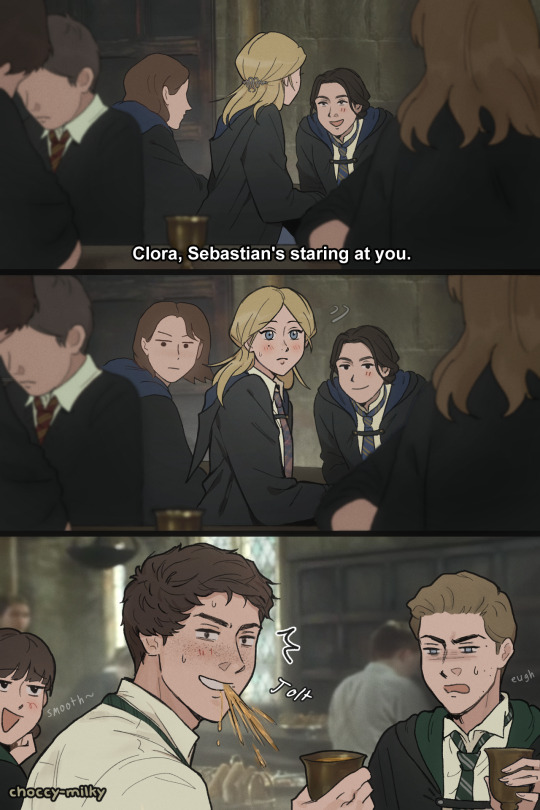
smooth, seb 👍 ((redraw of this scene from the goblet of fire))
#i changed it from 'looking' to 'staring' tho bc 'looking' wasnt intense enough for sebs vibes LMFAO#also i originally didnt draw clora with her hairclip since this is before theyre together obviously#but then i decided this could be after he gives it to her/confesses and during the time shes nervously avoiding him LOL#i put way too much consideration into when this scene redraw could canonically fit into my own canon LMAO#need to draw more pining seb before they get together tho I LOVE ITTTTT.... seb being flustered and desperate is just 😩🤌#hogwarts legacy#sebastian sallow#sebastian sallow x oc#sebastian sallow x mc#ominis gaunt#anne sallow#clora clemons#sebastian x mc#samantha dale#choccyart#clora and cho both being in ravenclaw and having alliteration names that start with C🤝🤝🤝#love the random girl on the left idk who she is or if shes even friends with clora but she just wants the tea and girl same
2K notes
·
View notes
Text
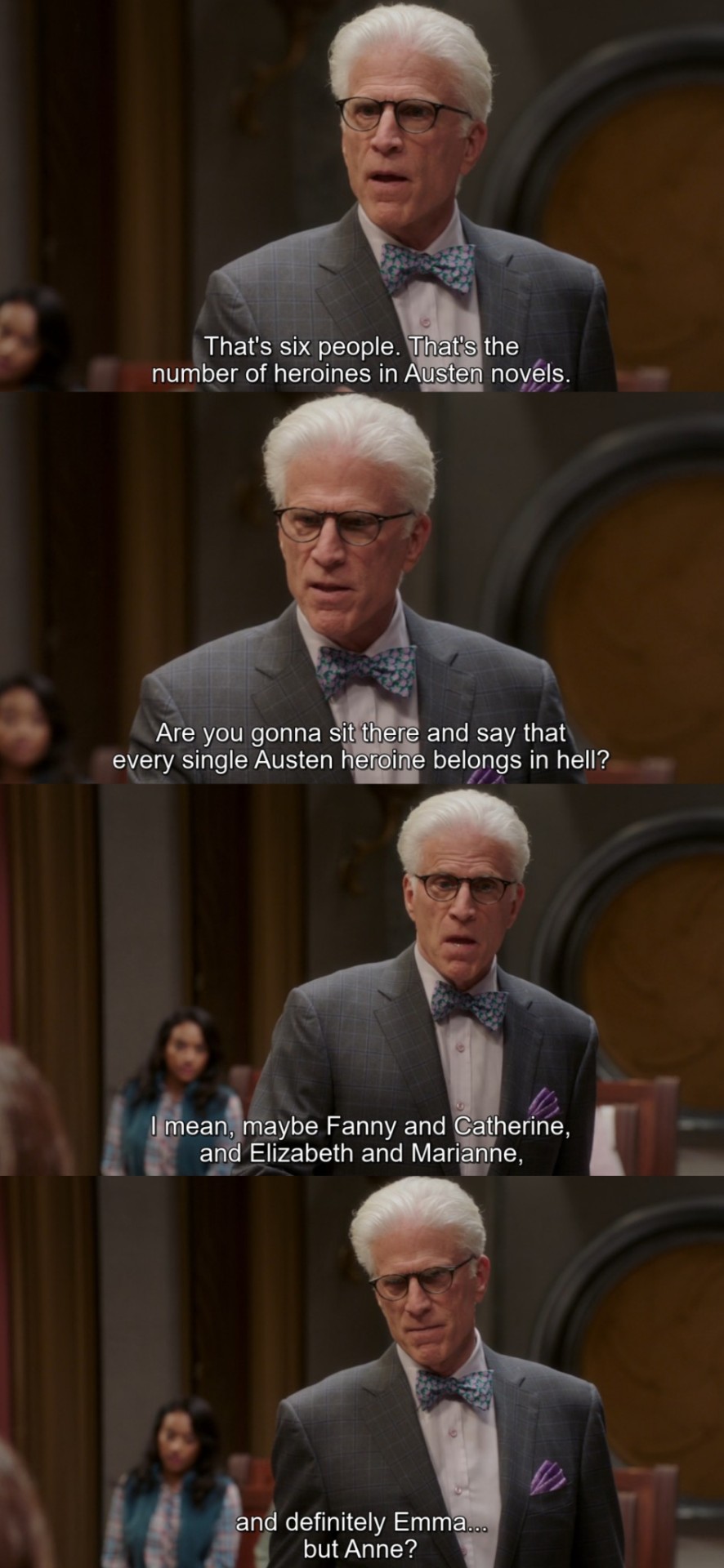
#jane austen#the good place#pride and prejudice#emma#persuasion#sense and sensibility#northanger abbey#mansfield park#anne elliot#elizabeth bennet#marianne dashwood#fanny price#catherine morland#emma woodhouse#tgp#my posts#i feel like i need to explain this 😂#this just came to me when i realized the numbers matched up#and no shade to any of the girls!! i love them all!!#but anne is definitely the best person among them in the tgp sense#(don't) notice i switched elinor for marianne bc otherwise i couldn't choose between elinor and anne 😗#also check the notes for the fanny explanation
2K notes
·
View notes
Text
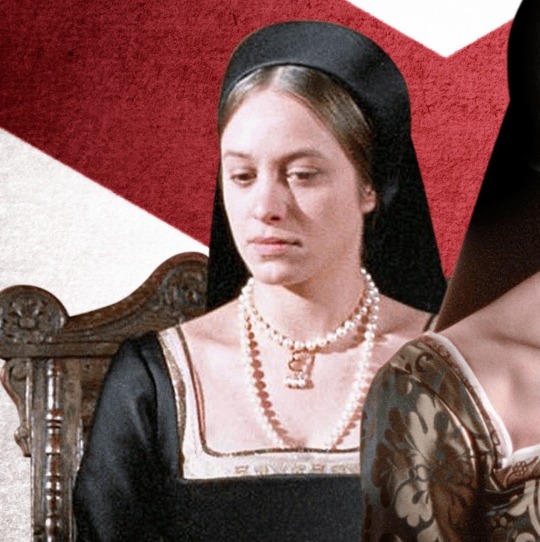
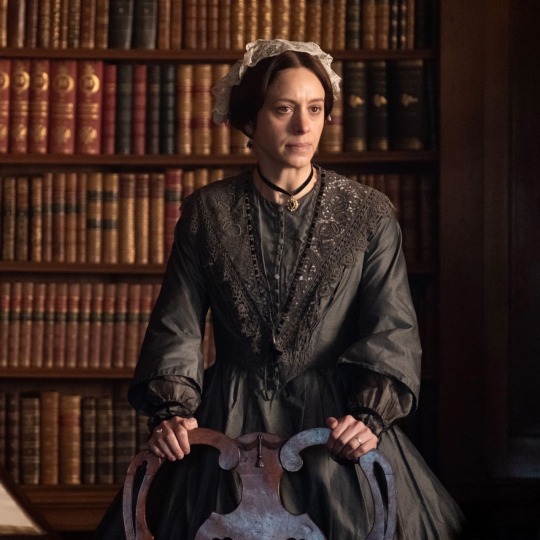
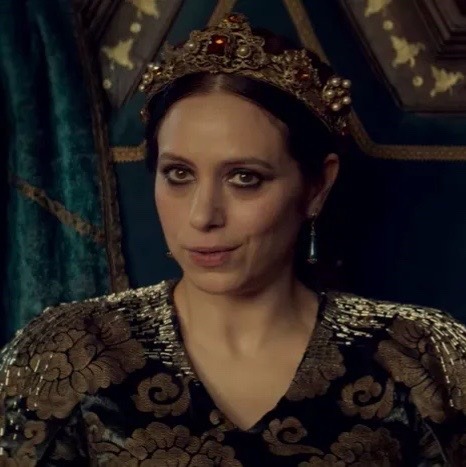
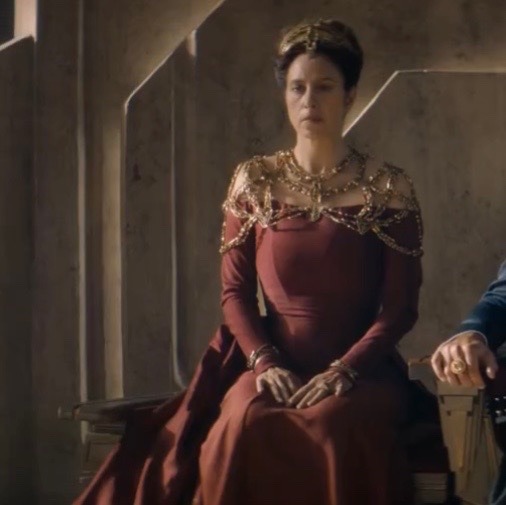
when someone needs an actress to absolutely devour the role of a queen, they call her
#jodhi may#anne boleyn#queen calanthe#the witcher#the other boleyn girl#dune prophecy#not pictured is queen anne from renegade nell bc apparently there's no photographic evidence of her in that show
279 notes
·
View notes
Text

hell yeah
#no one is doing it like them#i was gonna act cool and just be like banger post what else is there to say and write nothing else but like. No.#thinking about how incredibly intricate sashannarcys relationship w each other is in a realistic standpoint#bc this is really just. the experience isnt it. theyre just a girl#crazy how intertwined they are to each other crazier how they go bck to one another regardless of drifting apart#well. not crazy per say but you know what i mean.#in the heart of it all the three of them really do just feel like the most well written trio of characters ive ever seen. even outside of#the ship itself. they mean so much to each other. whats craziest is how matt based it on his own relationships 😭 imagine airing all#that out for the world to see. and to make it a 'love letter' to that person that was the anne boonchuy in his friend group. even crazier#everyone say congratulations amphibia for being the only show about amphibia
137 notes
·
View notes
Text
Portgas D. Anne

#Anne bc Rouge Said if Ace was a girl she’d name him that#ANYWAY AAGGH FINALLY EGTTING TO RENDER THIS WAS SO FUN TO MAKE#digital art#my art#fanart#art#digital illustration#one piece#portgas d ace#ace
202 notes
·
View notes
Text

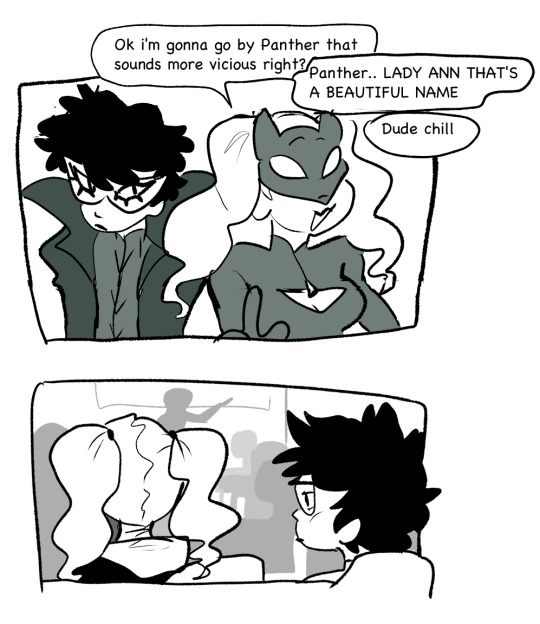


jealous
#I ALMOST LOST MY COMIC thats why some of it is green#i was able to restore it a little bit but i had to redraw a whole panel#i almost had a heart attack#art#comic#rei akiba#ann takamaki#ryuji sakamoto#morgana#p5 morgana#ren amamiya#persona 5#persona 5 royal#persona 5 protagonist#i find myself being jealous of Ann bc she gets to be a girl#so my Ren is gonna be jealous she gets to be a girl#Also Ryuji liked her outfit and it made my ren jealous#Dont get me wrong i like Ann but i always feel bad when she acts like we are super good friends and i hold these feelings for her#its not her fault#she doesn't even know#maybe i'll make a comic about her talking to Rei in the future#i gotta keep playing#p5 skull#p5 joker#p5 panther#p5 mona
149 notes
·
View notes
Text
In defence of Will Ladislaw
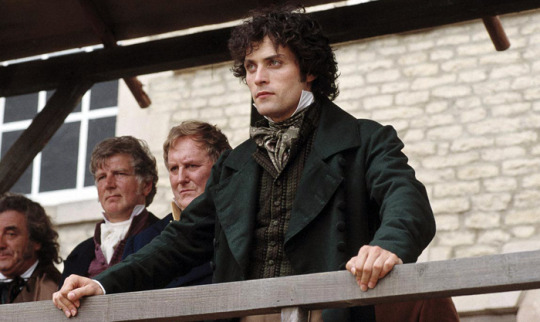
George Eliot's characterisation of Will Ladislaw is one of the few aspects of Middlemarch that is not universally praised, with no less a person than Henry James commenting in 1873 that he lacked “sharpness of outline and depth of color”, making him the novel’s “only eminent failure.” And while Will's character is certainly not as clearly defined as some of the other characters in the novel, I believe that this was absolutely intentional on Eliot's part. Middlemarch is full to the brim of characters who believe they know exactly what they want—not least among them, our two protagonists, Dorothea Brooke and Tertius Lydgate, whose ardent ambitions and inflexible attitudes lead them into catastrophic errors of judgement and unhappy marriages.
By contrast, Will's lack of strongly defined goals and his changeability are almost his defining character traits. He's aimless and pliable, prone to rapid mood swings and drastic career changes, with even his physical features seeming to "chang[e] their form; his jaw looked sometimes large and sometimes small; and the little ripple in his nose was a preparation for metamorphosis. When he turned his head quickly his hair seemed to shake out light."
Will’s inscrutability is closely tied to his ambiguous status within the rigid class structure and xenophobic society of Victorian England, with his Polish ancestry and “rebellious blood on both sides” making him a target for suspicion. He is repeatedly aligned (and aligns himself) with oppressed, marginalised, and outcast populations—Jewish people, artists, and the poor.
He serves as a narrative foil for characters like Lydgate and Edward Casaubon, who prioritise specialist expertise above all and are consequently incapable of broad knowledge synthesis. He critiques Casaubon's life's work as being "thrown away, as so much English scholarship is, for want of knowing what is being done by the rest of the world." By contrast, Will serves as Eliot's defence of the value of a liberal education. One of the first things that we learn about him is that he declines to choose a vocation, and instead seeks to travel widely, experiencing diverse cultures and ways of life. He has broad tastes and interests, trying his hand at poetry and painting before eventually pursuing a career in politics.
He also functions as a narrative foil for Dorothea. Will is initially apathetic to politics, whereas Dorothea initially professes herself to be disinterested in art and beauty. This is perfectly encapsulated in their exchange in Rome, when Dorothea declares, "I should like to make life beautiful—I mean everybody's life. And then all this immense expense of art, that seems somehow to lie outside life and make it no better for the world, pains one", to which Will replies, "You might say the same of landscape, of poetry, of all refinement [...] The best piety is to enjoy—when you can [...] I suspect that you have some false belief in the virtues of misery, and want to make your life a martyrdom.”
By the end of the novel, Dorothea unlearns some of her puritanical suspicion of sensual pleasure, whereas Will becomes more serious, compassionate, and politically engaged, dedicating his life to the accomplishment of humane political reforms. They are both flawed individuals, who ultimately become more well rounded through their relationship with each other. Admittedly, Dorothea's influence on Will is more significant than his on her—and once again, I believe that this was intentional on Eliot's part.
In my opinion, the negative response to Will Ladislaw at the time of Middlemarch's publication (and in the centuries since) was and is profoundly informed by gendered expectations of masculine dominance in romantic relationships. Will's marriage to Dorothea has often been described as disappointing, with many readers and critics viewing the ambitious Lydgate as the embodiment of the ideal husband that Dorothea outlines at the beginning of the novel—a talented man engaged in important work for the betterment of humanity, to whom she can devote herself.
However, one of the central themes of the novel is that people are often mistaken in their beliefs about what they want, and Dorothea's marriage to Edward Casaubon certainly demonstrates that she would not in fact be happy living her life in submission to a man who does not respect her opinions. I firmly believe that Lydgate's misogynistic attitudes and expectations would have made it impossible for him to be happy in a marriage of equals with a woman like Dorothea. He is explicitly drawn to Rosamond Vincy because she has "just the kind of intelligence one would desire in a woman—polished, refined, docile."
By contrast, George Eliot made a deliberate choice to pair Dorothea with a man who is not ashamed to be influenced by her, and indeed looks up to her as his moral superior. Through Dorothea's influence, Will discovers his life's work. In turn, by marrying Will, Dorothea is able to pursue her true passion. As a result of their influence on each other, these come to mean the same thing—reform. Thus, George Eliot grants Dorothea Brooke a subversively feminist, politically progressive, and profoundly cathartic ending: a life of companionate marriage, sensual pleasure, and meaningful work, in which Dorothea can devote herself (within the limited means available to her as a woman in the 19th century) to the achievement of just and compassionate reforms that "make life beautiful" for everybody—herself included.
#PUT SOME RESPECT ON HIS NAAAAAME#hello please enjoy this fucking essay that I wrote#I haven't cited them here bc I'm not insane but I did in fact read several academic articles while writing this post#so if you wanna see my sources/ do some further reading let me know#i love pouring all my fandom energy into content that no-one gives a shit about#(girl who just posted an Alias Grace fic that noone will ever read and is currently working on a Middlemarch fic noone will ever read voice#Middlemarch#George Eliot#Mary Ann Evans#Will Ladislaw#Dorothea Brooke#Edward Casaubon#Tertius Lydgate#classic literature#19th century literature#classic lit#books
137 notes
·
View notes
Text
Something I find funny is that the reason I now have a preference for how my name is pronounced is because in my autistic desire to fit in and not cause trouble I was forced to choose.
Like, yes. Now I prefer the one I chose. But I can't be certain if I'd have chosen it, or at all, as I got older because I literally. Made a conscious choice when I was in like, second grade.
Like. My name is Anne (pronounced Ann) but whenever people would ask how I wanted it pronounced I USED to go "oh, whichever" because I didn't care! BUT MY TEACHERS AND EVERYONE WOULD MAKE A HUGE DEAL OUT OF IT WHENEVER I GAVE THAT ANSWER???
I'd either have the annoying "funny" teachers go, "Okay, Whichever, haha!" and make fun of me (not ideal) or they'd be so concerned/upset when I told them I'd be fine with whatever they chose (less ideal) because, apparently, it being MY name meant I had to have a preference? Despite the fact that I legitimately did not at that point.
So I quite literally went home one day and sat down and thought about it and choose what I go by, and tbh a good portion of it was because there WAS a girl named "Annie" in my class so I chose the other one to avoid confusion.
Like, yeah, I now go by the version not pronouncing the "e," but if you do, it doesn't bother me. I have relatives who still call me "Ann(i)e" and I don't care. If you ASK, I'll tell you it's Ann(e), but otherwise? I don't care. I have people write Ann as my name BECAUSE of how I pronounce it, and it doesn't bother me. It's my name, but it's not like I'm super attached to it? Not like I want a new one, but more like how I see my gender, it's like sure whatever.
(The only time I was bothered was once when I was like 17 a guy I cashiered ARGUED about how to pronounce my name because I didn't pronounce the "e"???? And then my correcting him and not letting him run roughshod over me meant every fucking time he came in he'd pout and tell me I was mean to him. This was a grown ass man, and also I'm practically faceblind. I only recognized him because he'd do the same song and dance and I'm like sir, get the fuck out of my gas station. That just flabbergasted me I'm like, I have the whitest girl name, and I'm STILL getting people having issues with it??? Hellooo????)
Anyway that should have been everyone's first clue because I literally chose a preference to mask better, lmao.
#long post#personal#this is stupid i just thought of it bc a coworker wrote my name as ann and it happens a Lot#but yeah. i have a preference now. but i didnt when i decided to lmao#i just got tired of everyone getting upset when i told them to choose whatever they preferred#by whitest girl name i mean like. how am i getting issues with how to pronounce it or getting into arguments with how to#vs if someone has a name that that same white guy wants to make fun of or argue how to pronounce#not that that's okay but my name is straight up basic bitch how did he still have an issue
21 notes
·
View notes
Text
just started laughing really hard
#ann cries about feh#dorothea!!! run!!#if they had a support i 100% believe this is how it would go. extra points if inigo has noble lineage (PRINCE?!??)#you know before they have the classic ‘i was wrong about you’ make up whatever#inigo with dorothea is very much that one post to me#the one thats like#‘as a bi man its hard talking to girls bc are we queening out or do you want me’#I JUST WANT MY FAVS TO BE FRIENDS OK
16 notes
·
View notes
Text
hey guys grins

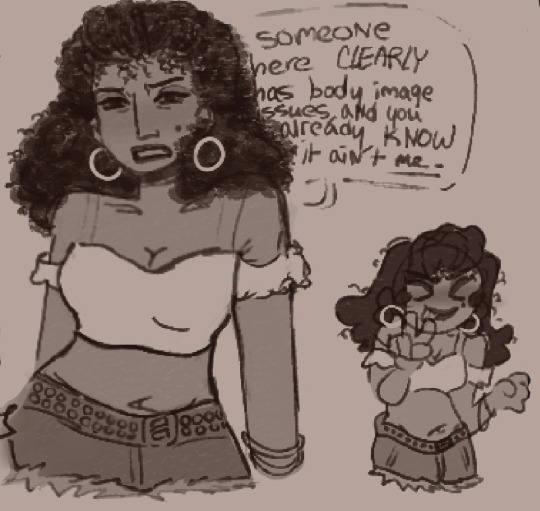


text in the second one says “somebody here clearly has body image issues, and you already know it ain’t me.” text in the fourth one are the lyrics to say it ain’t so by Weezer (specifically the bridge)
#total drama#tdroti#td scott#td dawn#td jo#td anne maria#td zoey#I actually fucked up anne Maria’s hair so bad I’m so sorry girl. I need to learn how to draw curly hair#fourth one is based purely on headcanon. I’m cringe but I’m free (not really)#you all don’t understand the struggle I went through with zoey’s hair#I tried to do a different hairstyle than the original bc it’s SO BORING but I gave up. I reverted.#iwsyo’s art
74 notes
·
View notes
Text
🕯️ princess diaries 3 mia thermopolis curly hair 🕯️
#anne looks soooo cute with curly hair too#i think it would heal smth in the little curly haired girl in me#who cried her hair with a straightening iron for YEARS#fried** cried too bc is sat on my straightening iron in 8th grade
14 notes
·
View notes
Text
Thing that I feel like I need to bring up here about Persona 5: most of the girls are competent cooks.
This isn't headcanon, this is fully canon. They cook together pretty often during Strikers and have pretty good results.
This isn't just because they're being helped by the protagonist either by the way, Ann, Haru, and Makoto cook with Yusuke some pretty good curry of their own that Joker only helps with at the last minute, and Haru teaches Zenkichi how to cook to make better meals for his daughter since he's not a good one like at all.
The only one we don't see cooking among the thieves during the game is literally Futaba who is considered their resident taste tester. Futaba, however, is seen baking in the actual P5/R if you romance her, so she probably knows how to follow a recipe well.
I just need more people to know this because I know there's a side of the fandom that keeps making the girls (specifically Futaba, Ann, and even Haru sometimes) as horrible cooks coming from jokes from previous Persona games. I know it's a funny haha joke but it's a little iffy to try to push this idea about the girls just because of previous installments.
#mayaposts#persona#p5#persona 5#ann takamaki#haru okumura#futaba sakura#makoto nijima#not really gonna bring sumi i to this considering that thats kinda one of the main things she does#i want to just discuss the main pt girls considering i see people keep doing this for ann and futaba specifically#and honestly it irks me like it reeks of misogyny a little#like i know it comes from jokes from the previous persona games with chie and yukiko being awful#but it's a little iffy to bring that into the next game bc of eithrr archetypes or just memes or whatever
28 notes
·
View notes
Text

skipping a few steps of explanation but ng+ au gone wrong (the lads roleswap) and this somehow works out in akira getting a magical girl outfit

#persona 5#p5#akira kurusu#persona 5 protagonist#marsh tries#ng+ au gone wrong (not clickbait)#akiras having a time and a half but on the bright side magical girl hours#and he gets pockets. ann is jealous#n e way i was absolutely going through madoka magicas tvtropes to come up w/ smth for the aoa thing#and saw that and thought it would be funny so#also head in hands i have so many tabs about flowers open bc of this and i dont even know if the flower i was drawing comes across
42 notes
·
View notes
Text






#sugar apple fairy tale#ann halford#shall fen shall#anime gif#anime girl#anime#by moka#shoujoedit#fyanimegifs#dailyanimatedgifs#animangahive#anisource#userdabiluna#userokkottsus#useraki#WHEN HE DID THIS ENTIRE SCENE I WHEPPED I CRIED#I CRIED AND JUST YEARNED BC WHY I WANT THIS I WANT THIS IS THIS IS IT#THEIR RELATIONSHIP BUILDUP FROM BEGINNING TIL NOW IS EVERYTHING YK HE JUST WANTS HER NOW AND DGAF#MY GOD#MY GOOD SAVIOR GOD THE WAY HE SAID GOOD GIRL#*alyssa exits chat*
134 notes
·
View notes
Text
something I've found a bit funny if u compare the kids designs in toh, gf and A are how dip and mabe, being 12, are so tiny compared to how lanky toh and A kids are even w them only being a few years older. toh's designs is a bit less jarring 2 me since it's more realistic, but if u put the mystery twins beside calamity trio it's silly how the latter look so l o n g in comparison
#might be remebring wrong but i think a reason for this was that matt wanted the girls to be older i think#bc of. dis ney ig. but then he just didnt change their appearance at all outside of like name(?)#the girls being taller than the frogs make them seem like giants so when u reach s3a where anne is still notably shoter than#both her parents is like... shes jusst a girlllllll#hilda's designs matches best w the mystery twins' before their lil timeskip in s3#and the change in their design is so wonderful to me. whats even MORE endearing to me is how theyre still SO TINY next to the adults 😭#ok sorry for rambling just thinking out loud goodbye aaiin#again
68 notes
·
View notes